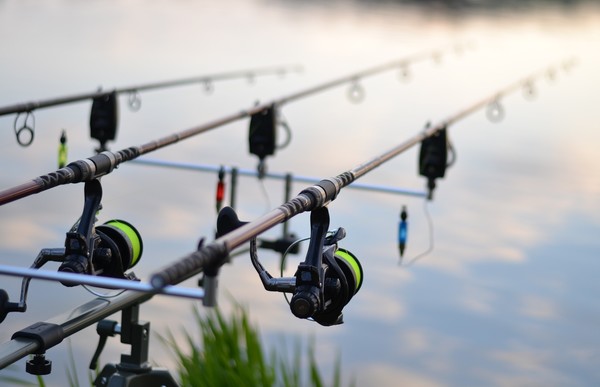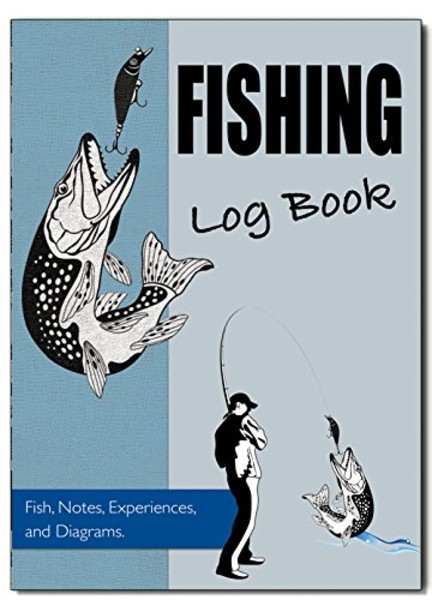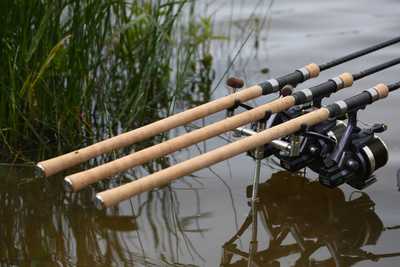Ultimate Coarse Fishing for Beginners Guide
Coarse fishing is a hugely popular hobby and sport to many people across the country.
With our guide to coarse fishing for beginners, you will gain the knowledge to become a proficient coarse angler in no time.
What does coarse fishing mean?
Coarse fishing is a type of fishing where the angler targets coarse fish.
So what are coarse fish?
The following fish would be classed as coarse fish and would be among the types of fish you can expect to catch.
Chub are a silver colour fish with a red tinge to their fins. Chub are usually found near areas of cover such as heavy weed, overhanging trees or lily pads.
Roach are silver in colour with a red tinge like chub, however, are much smaller. They are found in shoals and can often be caught in great numbers. They are very beautiful looking fish and one of the most common in the UK.
Carp one of the most popular fish to target in the UK. Carp can grow in excess of 40 lbs and take time, dedication and specialist tackle to catch. Smaller carp can be caught using coarse fishing tackle.
Perch is a predator type of fish that feeds on worms, maggots, and castors. Perch have a sharp pointy dorsal fin that gives them an aggressive look and are very popular to catch.
Barbel is an extremely hard fighting fish for their size and ever-increasing in popularity. Barbel is often found inflowing rivers and get their name from their barbules which resemble whiskers on a cat.
Tench a very distinctive looking fish that is a stunning shade of green complete with a layer of slime. Often found in areas of the lake with lots of cover.
Bream is an oval-shaped silver fish that is a bottom feeder complete with a layer of slime, much like tench and can be found in lakes and rivers.
Coarse Fishing for Beginners - Equipment
What do I need to go fishing for the first time? How to start fishing? To begin, coarse fishing for beginners requires the following tackle.
- Rod - the 'float' rod in conjunction with the reel is one of the major pieces of tackle that allow you to cast your bait and rig to your desired spot on the lake or river. When a fish is hooked it allows you to play and land the fish. A beginner 'float' fishing rod can be purchased for around £20 to £30.
- Reel - the reel plays an important part in casting and reeling in your fish. It holds your fishing line and has features such as the bail arm, drag system, handle and spool. A 'fixed spool' fishing reel can be purchased for around £20 to £30.
- Line - your fishing line is wound onto your reel and is the only thing between your reel and the rig. The rig consists of the float, weights or shots, hook and bait. I would recommend a breaking strain of around 4 lbs which is perfect for a beginner coarse fishing setup.
- Float - the float is used to suspend your hook and bait at a given level in the water. When a fish takes the bait the float will go under the water to indicate you have a bite. Floats are often made of highly bright colours to make them as visible as possible in the water. I would suggest you purchase several different floats and try them out. They are inexpensive and was always something I looked forward to buying when I was a kid.
- Hooks - the hook will hold your bait and will hook into the fishes mouth when you get a bite. They come in barbed and barbless varieties and you will often use the latter which is usually based on the rules of the fishery you are visiting to help with fish safety. The general consensus is barbless hooks do less damage to the fishes mouth, although this is often argued against. They are extremely sharp and so take care when handling hooks. I would suggest you buy a pack of size 14 barbless hooks, to begin with.
- Weights or shots - the weights are attached to your fishing line and have two purposes, the first to weight down your line to allow your hook and bait to reach the bottom of the water and the second, to give you some weight to allow the rig to be cast out to your desired spot in the river or lake.
- Landing net - if you manage to hook a larger fish the landing net allows a safe way to bring the fish onto land, unhook and return in the safest manner possible.
- Keepnet - some fisheries allow a keep net, where you can hold all of the fish you catch during the day. Some anglers will total the weight of all the fish they catch during a session and this is often how competitive coarse anglers determine the winner of a contest.
- Disgorger - the disgorger is a very useful tool that will assist in removing the hook from the small mouths of the fish you catch. It can sometimes be difficult to remove the hook and this tool is a must-have for fish safety.
- Plummet - the plummet is used when you start fishing to gauge the depth of the water you are fishing in. Once you know this you can fix you float and weights in the correct position to ensure you are fishing at the correct depth to catch fish.
- Rod rest - When you have cast out your rig, you will want a rod rest to place the rod in whilst waiting for a bite. A rod rest is inexpensive and very useful when fishing for long periods.
- Tackle and bait box - you will need somewhere to keep all of your fishing tackle and bait, a tackle box is perfect with lots of compartments for each item you have. A bait box will contain air holes to keep you maggot nice and fresh. You can, of course, store any type of bait in a bait box.
Coarse Fishing for Beginners - Bait
Now you have a better understanding of the coarse fishing tackle required, we will cover some of the coarse fishing baits that can be used.
- Maggots - fish love maggots and would be my choice of best coarse fishing bait. You buy maggots by the pint from your local tackle shop or fishery you are planning to visit.
- Castors - castors are the chrysalis of a maggot in a shell-like form. They are slightly smaller than maggots and tend to be a more round shape. They are a favourite of larger coarse fish.
- Sweetcorn - a simple can of sweetcorn from your local supermarket is a devasting bait to catch fish. I often switch between maggots and sweetcorn as my primary baits.
- Boilies - they are an egg-based fishmeal type of bait that is formed into a ball and are a favourite of carp. They tend to be used less in everyday coarse fishing and more by carp specimen anglers.
- Luncheon meat - again a simple bait that can be purchased in the local supermarket that works wonders as fishing bait. Simply cut up into cubes and attach to the hook.
- Pellets - a favourite to attract all types of fish. Pellets are an oil-based bait that can be purchased in many different sizes.
- Groundbait - this type of coarse fishing bait is purchased in powder form and mixed with water to form a sloppy paste-like mixture and is used to attract fish to your swim (the area you are fishing) and is thrown in by hand or catapult to your fishing spot.
- Bread - a small piece of bread can be wrapped and compressed around your hook to provide a very attractive bait for coarse fish, always have some in your tackle bag.
- Worms - this bait is more for targeting perch with their predator like nature. Perch are stunning fish in my opinion and I love to catch them. I do not use worms very often but something to bear in mind when you become more experienced.
What you need before?
Before you can go coarse fishing you will need a fishing rod licence from the Environment Agency. These can be purchased for a single day (£10), eight days (£20) or for a full year (£45) depending on how often you are planning on going fishing. You can pick up a licence from the Post Office or online. Please do make sure you buy a rod licence and always have it in your tackle bag, failure to do so can result in prosecution and a fine up to £2500.
Any angler under the age of 12 does not require a licence to fish.
There are also coarse fishing season dates where fishing is not permitted, this is known as the close season. The coarse fishing close season is 15th March to 15th June and this applies to all rivers with lakes and canals being the only exception to this rule. Again, check with your local tackle shop or fishery to confirm when you can fish.
Where to fish?
A big decision to make is where to fish. Research local lakes and rivers to ensure you are allowed to fish there. Find out as much as you can about the fishery such as.
- the species of fish.
- facilities on offer.
- how best to fish, many venues will favour certain methods and baits that catch fish.
- how much will it cost to fish, there is usually a day ticket price.
Head down to your local tackle shop to get some great advice. They are always very friendly and will answer any questions you may have. I would also suggest you buy as much of your tackle from these local shops to support them.
When you have decided which fishery you are going to visit, always ensure you tell someone your plans and when you are expected to return, again this is all about being as safe as possible when fishing.
Fish safety and welfare.
All fish must be returned to the water after being caught. Use a barbless hook, a disgorger, a landing net and return fish to the water in the safest manner possible. Please do not throw fish back into the water, this can harm the fish no matter how small they may be. Either crouch down or use the landing net to place the fish back into the lake or river.
If you catch a larger fish, use an unhooking mat. Place the fish on the unhooking mat whilst you remove the hook and never put the fish onto the floor which can damage the fish greatly. If you are using barbless hooks, the hook should come out with relative ease, if you are struggling to remove the hook please use the Disgorger. This is a very inexpensive tool that every coarse angler must carry in their tackle bag.
By following these simple step you will preserve the fish for future generations and hopefully, they will grow into much bigger fish to be caught another day.
Types of fishing
There are a few different avenues when it comes to coarse fishing.
- Pleasure fishing - this covers many anglers including yourself as a beginner who is fishing as a hobby and pure enjoyment. I find fishing is incredibly relaxing being out in nature and is a very exciting hobby when you get a bite no matter how big or small the fish.
- Match fishing - this is where a group of anglers competes to see who can catch the largest total weight of fish. They are not competing for the most or the biggest fish but the total weight at the end of the day. Matches often last for several hours and some have large prizes including cash up to £50,000.
- Specimen fishing - this is where anglers target a certain species of fish. Many anglers including myself started coarse float fishing and moved onto carp fishing where anglers target the largest of carp, which can grow over 50 lbs in the UK and even larger in Europe with France being a particular favourite for many anglers to fish. Carp fishing required dedicated tackle and lots of patience!
Summary
Coarse fishing is a fantastic hobby and sport to be involved in and hopefully, this coarse fishing for beginners guide has given you a better understanding of how to get started in coarse fishing.
As a beginner coarse angler, you do have lots to learn but be persistent and with time you will become an experienced angler catching lots of fish and who knows where this could take you. Perhaps you will become a match anglers competing all across the country or you will become a specimen angler and target the largest carp across Europe.
There are lots of resources online to help you set up your rod, reel, and coarse fishing rigs but the key is to practice and you will gain the knowledge you require in no time.
Visit your local tackle shop to purchase anything you need and ask questions, the community is very friendly and will offering help to fellow anglers.
We hope you enjoyed the article, see you soon.
Other Articles We Think You'll Like
Join the group?
Our one-click login makes it easy to join our carp community. You can leave your thoughts, ask questions and be part of the ever growing group. Just use the buttons below to login now!
What do you think? Let us know what you think about the article by leaving a comment
We´d really appreciate it!











0